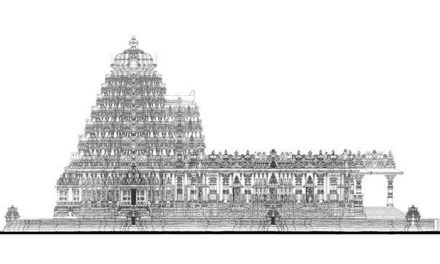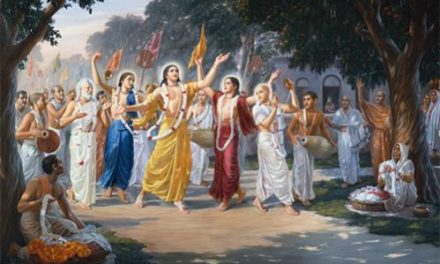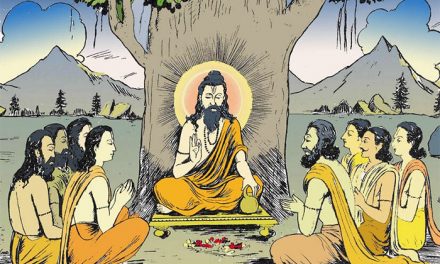The Goddess Mahalakshmi is connected with ‘Mahat Lakshana’, i.e. having noble characteristics. Lokamataa: ‘World Mother’. She is the mother of all the people of the world, distributing affections and nourishment equally to everybody. Ramaa: ‘Beautiful’. She likes to be connected with the beautiful (ramya) nature (prakrti) of human life.
Pankajabasini: ‘Pankaja’ is lotus which comes out of the mud (panka). The Goddess likes it very much to settle on this, for which She is called ‘Pankajabasini’. The cause of selecting the lotus for settling on is to teach the world that although it is born from the dirty mud, still the lotus can be blessed for its cleanliness, softness, beauty, purity, splendour and fragrant disseminating qualities. Hence one should not be disheartened for bad family background only, but try to be clean in habits, pure in heart and noble in behaviour.
Padmalayaa: Here ‘Padma’ is lotus and ‘Alaya’ is adobe. Goddess Laxmi has selected “padma” for Her “alaya”, for which She is called Padmalayaa. In the true sense, ‘Padma’ is compared with a clean and sacred heart and the Goddess always wants to make this pure heart her abode. In other words, the man with a clean heart can get the blessings of Goddess Mahalaxmi for ever.
Kamalaa: ‘Kamal’, the flower, being very soft, sacred, pure, clean, splendid and fragrant disseminating, has been liked very much by the Goddess Mahalaxmi, for which She is known as ‘Kamalaa’. This gives the indication that the man who seeks blessings of Goddess Mahalaxmi should become like a flower.
Chanchalaa: The Fickle Goddess. Her movements being very fickle (chanchal). She immediately leaves the man whose character starts to become impure.
Chapalaa: The unstable Goddess. She leaves the men like lightening (chapalaa) who start to become impure, immoral, a deserter, proud and arrogant.
Ksheerabdhi Tanayaa: ‘Daughter of Ocean’. ‘Ksheerabdhi’ is Ocean and ‘tanayaa’ daughter. She is Ksheerabdhi Tanayaa because She was produced from Ocean when its water was churned out for nectar to make persons immortal. She appeared before the world being ornamented with precious gems and jewels, giving indications that the Ocean is the treasure of gems and jewels from time immemorial.
Men Blessed by the Goddess
According to Hitopadesha – Mitralava, “Goddess Laxmi blesses the man who is industrious and of very promising character. It is the version of the cowards that the wealth is given by Fortune. So discard the fortune and achieve success through your own efforts. If the success is not achieved after all of your efforts, then find out, there must be some faults some where.”
Men Debarred from Blessings
Persons not industrious, who are devoid of duties, lazy, coward, desperate, selfish, jealous, tempted, irritable, greedy, envious, despotic, mean, hypocritical, cruel, tyrant, thief, liar, ungrateful, incontinent, inhuman, too much miser, deceitful, crooked, unruly, notorious, stupid, impudent, sinful, devilish are debarred from blessings of Goddess Mahalaxmi.
Mahalaxmi Purana
Outwardly, Mahalaxmi Purana contains a very beautiful story of Lord Jagannath, Balabhadra and Goddess Mahalaxmi, in which Mahalaxmi was driven out from the temple (Srimandir) by the two Lords with the allegation that She frequently visited the cottages of very low class people who were untouchable, and without being purified enough entered the temple palace to cook food and feed the two Lords. They gave her much insultation, calling bad names to Her father and drove out, after disornamenting Her, with caution not to keep steps in temple premises in future.
The bride Mahalaxmi, even after being so much tortured, begged apology to the Lords, but they turned a deaf ear to Her prayer and closed the temple door mercilessly. She cursed them to suffer for this injustice and inhuman behaviour by not getting food to eat till They repent for their misdeeds and request Her to serve the food for Them.
Mahalaxmi ordered the ‘Betals’ to take away all the belongings of Srimandir, including food stocks, grains, jewels, clothes, and a golden cot in the dead of the night, when the Lords would be sleeping, and dry the water source completely so as to make non-availabile a drop of water in the morning.
The Betals worked strictly according to the orders of their Mistress, and the two Lords Jagannath and Balabhadra became street beggars, begging alms from door to door. But They were mercilessly driven out by all the citizens taking them to be thieves, Their robust health and appearance having no resemblance with beggars. They adopted all possible means of begging but were not successful in getting alms continuously for twelve years, and suffered from starvation. At last they reached the door of an aristocratic house on the seashore in the guise of Brahmins and begged for food to eat, and this was actually the house of Goddess Mahalaxmi, built by Viswakarma in the boundary of Varun’s kingdom.
Mahalaxmi, being aware of all the facts, asked the two Lords through her maids, who were ‘Chandal’ by caste, the most untouchable persons of the society, how the two brothers, being Brahmin by caste, would take meals in their house. The two brothers decided to cook foods themselves if all the commodities like rice, vegetables, firewood and utensils would be supplied to them by the Mistress of the house, and accordingly they made their request. Orissa Review * December – 2007
Goddess Mahalaxmi arranged a supply of everything for them that they needed, and at the same time prayed to the Wind God to blow violently so that the wood would not burn to heat the water and turn black, creating heavy smoke and troubling the two brothers by causing a flow of tears from the eyes. They tried one after the other to keep the fire burning, but failed to achieve success. The elder brother, out of rage, took a piece of wood in his hand and giving a strong blow to the earthen pot, broke it down into pieces.
Now the two God brothers, finding no other alternative to save their lives, requested the maids to tell their Mistress that they were prepared to take meals in the house, even if they were chandal. The heart of the Goddess was immediately melted with those surrendering words and out of joy, she cooked many things instantly for the Gods and had them served through the maids.
From the mode of preparation of different delicious foods and from the style of serving the same, the two brothers recognised well the Mistress of the house to be none other than the Goddess Mahalaxmi. They begged an excuse for their faults with repentance and took Her on a procession to the Grand Temple, accepting all the terms and conditions brought by the Goddess against untouchability, inhumanity, high-handedness, casteism and many other points. From that day forward, the people of all castes and creeds, from Brahmin to Chandal, began taking of foods cooked in Srimandir together, without the slightest hesitation. The Mahalaxmi puja has continued to be performed in each house in the month of Margashira, every year.
In yesterday’s segment of ‘Epithets’, we ended with the story of Lord Jagannath and Balabhadra accepting foodstuffs cooked by the Goddess Mahalaxmi, and served by maids of low class. This pastimes is purported to symbolize Mahalaxmi as representing the good and pious housewives of aristocratic families, who are very affectionate and sympathetic towards the servants and labourers. The dependents and their family members regard them very highly, addressing as ‘Maa’ (Mother) or ‘Laxmi Maa’ (Holy Mother) and putting forth all of their difficulties before them without the knowledge of the housemasters, which the Landlords or Headmen do not prefer.
To discuss the subject matter of the story, we can name the landlords as ‘Baladeva’, but not ‘Balabhadra’ or ‘Balarama’. The meaning of ‘Bala’ being the ‘bullock, strength’ and ‘Deva’ being the ‘master’ or ‘owner’, the meaning of ‘Baladeva’ is akin to ‘the powerful landlords’. Similarly, we can name the ‘Headmen of the Societies’ as ‘Jaganath’ but not ‘Jagannatha’. Here ‘Jaga’ is ‘people’, ‘society’ and ‘Natha’ is ‘Head’. So ‘Jagannatha’ is ‘Samajapati’ or ‘Head of the Society’. As the housewives of the aristocratic families were being called as ‘Maa’ or ‘Laxmi Maa’, we can gladly call them as ‘Maa Laxmi’ but not ‘Mahalaxmi’.
Now Sri Baladeva, being addicted to luxury spent his time and wealth lavishly on opulence, voracious eating (it is mentioned of his taking 56 pauties of cooked rice at a time), and then having snoring slumber till the foods taken were digested. As the common men of the society always follow the footprints of their superiors, they all pretended to follow the same path as Baladeva, becoming luxuriant, careless and pleasure-seeking. The result was complete inactiveness on their part, with idleness prevailing everywhere. The housemasters had got no attachment to their families and what they earned they spent in merriment, pleasure trips, voluptuous eating and gambling outside, neglecting their wives, children, to suffer from starvation at home. If any objection was being raised by the housewives they were mercilessly beaten, misbehaved and illtreated.
But Maa Laxmi, who had Herself appeared to be victimized in the pastimes, could realise well the conditions of Her dependents, even if they were untouchable ones. She used to visit their cottages very frequently and help them to the extent it was possible. She advised the women folks to bring their family members to the correct path by way of good behaviour, simplicity and cleanliness. She devised some ways and methods for introduction in each family, so that all of the members would automatically be forced to be guided by Her methodised principles in the name of ‘Mahalaxmi Puja’ and ‘Sudasha Brata’. The procedures of their institution were so scientifically and hygienically framed that they would automatically correct the habits of all the family members, so they would become active, energetic, broadminded and able to achieve a very good moral character and success in life.
While instructing about Mahalaxmi Puja, she advised not to become an idolater, worshipping the idols in the temple, but to convert one’s own cottage into a temple by way of cleaning, decorating and purifying it by one’s own labour, then worshipping the food grains obtained from the fields, which is according to the Goddess Mahalaxmi Herself.
She has not emphasized reciting hymns (mantras) or exhibiting hand poses (mudras) but offering things with emotion (bhava) and devotion (bhakti) in the heart and mind. It has been mentioned of Her attending the cottages of Sadhavani, the house of Sadhava (the merchant), and Chandal (the sweeper). In doing so She has given indications that apart from the cultivations, prosperity can also be achieved through merchandise and the untouchable persons have also got equal rights to worship, provided they should become neat and clean in physique, dress and habits.
The instructions given by Maa Laxmi to achieve ‘Mahalaxmi’ are very educative for the males and females both to convert their cottages into heaven on earth. From Her teachings on human behaviour it is evident that a housewife can easily convert her housemaster into ‘Purusottam’ (Godly Man) and a housemaster can also convert the housewife into ‘Goddess Laxmi’. In case the housemaster has already gone astray, he can also be brought into the way if a housewife is resolved to do so, provided she should be prepared to stand boldly on her feet, even if violent storms would start to blow against Her. She has also proved this in Her own life by bringing the two most powerful and proud Lords of the time to the correct path.
Regarding the knowledge of Baladeva, that Maa Laxmi is frequently visiting the cottages of untouchable persons and entering the Grand Palace without being purified enough, He induced Lord Jagannath to divorce Her immediately. But Jagannath remained silent over the matter, though He was neither against the untouchability nor had He any objection for the activities of Maa Laxmi. Still, He could not oppose as He would not stand against the will of a most powerful Lord like Baladeva. Now the two Lords drove away Maa Laxmi after mistreating, misbehaving and disornamenting Her, and even scolding to Her innocent father. When Maa Laxmi prayed them to excuse Her, they closed the palace door turning deaf ears to Her prayer. This infuriated Maa Laxmi to curse them to suffer for their misdeeds by becoming poor and not getting food to eat for a complete twelve years, till they surrender to Her with request to serve food for them.
When the most-affectionate, pious and active Laxmi Maa left home, being everything for the poor, for the servants and labourers, they all quitted their Masters’ house immediately after the departure of the Holy Mother. Now acting as ‘vetals’, they caused destruction to the management of their Lords’ palace and took away all the belongings and food stocks in the dead of night. At the daybreak,when the Lords got up from slumber, they saw no servant in the palace, no belongings and food stock. They did not even get a drop of water to wash Their face.
Now realising their wretched conditions, the Lords decided not to show Their faces in the society and went out in the guise of yogis in quest of food, which they did not get anywhere due to the much wretched condition of the state for want of production. In the long run they adopted the work of begging, going from door to door, but each time they were driven out with caution not to beg, but to work and earn food. But they were so unfit for any work that they could not even protect a handful or corn-flake donated by someone in their hands, which easily flew away when the wind blew.
On the other hand, Maa Laxmi, being driven out from the Grand Palace, got a palace built immediately on the seashore in the jurisdiction of God Varun, by the help of Her dependents, ex-servants, labourers, merchants, sweepers and tenants, as if the things were done by Vishwakarma, so suddenly. The tenants, without depositing the crops of the lands in the Grand Palace, supplied sufficient foods and clothes to Maa Laxmi’s palace. In addition to that the dependent workers were kept engaged in collecting oceanic products, including gems and jewels for oversea trades through Sadhavas, from which sufficient wealth was being received for maintenance of all the people depending on Maa laxmi and distribution of cooked foods daily to the beggars, irrespective of castes and creeds in the palace premises.
Now the two Lords, being under starvation for a complete twelve years, came to know of the distribution of foods in the palace premises on the seashore, and they reached there in the guise of Brahmins to take food. But when they were told by the Mistress of the house, who had already recognised the Lords in disguise, that she was Chandal by caste, they tried to cook foods themselves with the materials supplied to them. But there also they failed to achieve success and at last surrendered themselves to the donor, even though she was Chandalini, requesting food from her hands.
Maa Laxmi immediately prepared many types of delicious foods in Her hands and got them served to the Lords till they were satisfied fully. Now the Lords, knowing well that the housemistress pretended to be Chandalini in front of the Brahmin pretenders, was none other than Maa Laxmi. They begged apology for their misdeeds and misbehaviour and received Her with honour, going back to the Grand Palace in a great procession. They agreed to all the terms and conditions brought by Maa Laxmi to remove casteism and untouchability fully from the land, to treat all men equally, and to allow all to take meals together.
In this way, the most powerful and proud Lords were punished for their misdeeds and misbehaviours, being compelled to suffer from starvation for complete twelve years while roaming as street beggars. Maa Laxmi with honour spent these years leading a most prestigious life, giving shelter to so many due to Her purity of mind and heart, high thinking, activeness and courageousness. Hence this pastime of Mahalaxmi should be studied in detail by all men and women. They should be guided by the instructions laid down in it, to get peace and happiness and achieve success and wealth in life.













